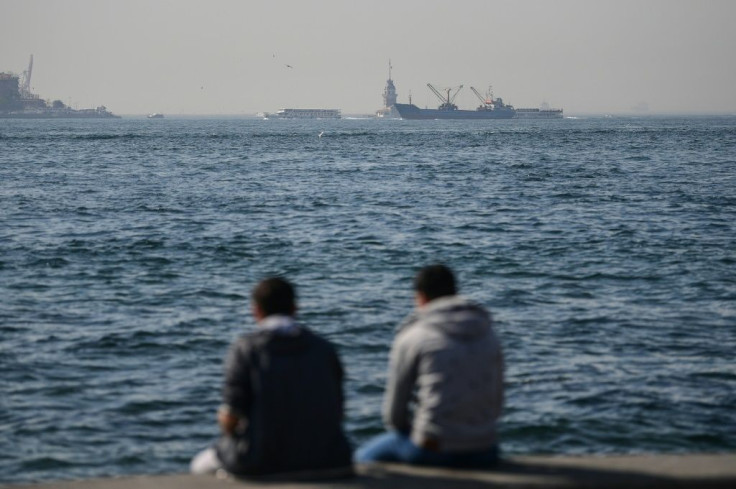Turkey Committed To Rapid Transport Infrastructure Development As Economy Rebounds

KEY POINTS
- Turkey has spent $334 billion in its transportation infrastructure since 2003
- By 2023, Turkey will have 10,890 miles in railway lines
- Turkey wants to spend $15 billion on Istanbul canal
Turkey has invested about $334 billion in its transportation infrastructure over the past 17 years since the ruling Justice and Development Party has been in office.
As a result, Turkey has greatly expanded its national transportation network and upgraded its means of transporting goods.
Cahit Turhan, Turkey’s minister of transport and infrastructure, said the Ankara government will continue to invest in a number of railway projects.
By 2023, Turkey will have a total railway length of 10,890 miles after the completion of a 3,423-mile new line, he said.
In March 2009, Turkey introduced high-speed train travel with the opening of the Ankara-Eskisehir rail line, thereby reducing the travel time between these two cities to an hour and 25 minutes. Eskisehir is located about 150 miles to the west of Ankara.
Another high-speed train, the 244-mile Ankara-Sivas line will begin operating in the second half of this year.
Turhan further said that about 40% of the country's population in seven provinces now has access to fast, modern travel. A total of 53.1 million passengers have traveled through Turkey’s high-speed train system thus far, Turhan added.
The minister also noted how the railways have upgraded their signalization and electrification processes.
"In 2003, we increased the length of signalized lines by 155% and raised it to [3,966 miles] from the previous level of [1,557 miles]. The signalization works are currently underway on a [1,437-mile] long railway line," he said.
Also, in 2003, only 1,294 miles of Turkey’s total railway lines had been electrified, representing about 19% of the total length of the lines across the country. Since that time, the ministry has electrified 3,575 miles in rail lines.
In addition, Turhan said that a system of railway networks that stretches along for 183 miles will be constructed to connect 38 organized industrial zones, specialized industry zones, free economic zones and ports in addition to 36 manufacturing facilities.
"In order to ensure faster and more economical transport of freight, we are connecting ports and railways," Turhan added. "[53 mile]-long railway lines are currently connected to 10 ports and four harbors and a railway connection to seven ports including Filyos in the western Black Sea and Candarli in İzmir is planned.”
Turhan further indicated that the government’s contractors have completed the manufacture of a prototype of a hybrid locomotive, which will boast lower operating costs and reduced fuel consumption.
Turkey is now the fourth country in the world that can produce a diesel and battery-powered hybrid locomotive as a prototype.
However, not all infrastructure projects in Turkey enjoy widespread support. For example, critics contend that Canal Istanbul, an infrastructure project designed to build a 28-mile canal to link the Black Sea and Marmara Sea by bypassing the Bosporus Strait, would devastate Istanbul’s ecology and generate few benefits.
The proposed canal carries a $15 billion price tag.
Turhan claimed that upon completion Canal Istanbul would provide safe passage for 185 ships daily (compared to 118-125 ships passing each day through Bosporus Strait), and could initially generate $1 billion from passing ships annually.
Some 50,000 ships are projected to pass through the canal in 2035, 70,000 in 2050 and 80,000 in 2070, he added.
Turkey would earn $5 billion annually from the passage of 50,000 vessels.
Turhan also said that the Bosporus is one of the riskiest crossing points for maritime traffic since a lot of dangerous cargo – like liquefied natural gas, chemicals, oil and explosives – pass through this waterway.
“There [has been] a 53% increase in the amount of cargo carried by ships passing through the Bosporus,” he noted, adding that dangerous cargo currently accounts for 35% of goods moving through. This poses a risk to the thousands of Istanbul residents and tourists who commute across the strait every day.
Turkey’s Ministry of Environment and Urbanization approved the environmental impact assessment report for the canal project late last year.
But environmentalists, trade unions and members of the opposition Republican People's Party strongly oppose the canal project. Some critics believe such funds would be better spent to prepare for earthquakes that often strike Turkey.
"Public resources should be used for the city's inhabitants who face the earthquake danger and our city should be prepared for the [next] earthquake," said canal opponent Turgay Halis Celik. "If we did not have a Bosporus naturally formed by the geodynamic forces of the earth, the canal project might be [necessary], just like Panama, Suez and Corinth strait. However, we have a natural Bosporus and the canal project is also more dangerous for ship navigation as it is longer, narrower and shallower. In other words, there is no project in which we will survive the passings without an accident or trouble. Those who claim that money will be earned from the project are misguided. Unless there is a situation [where] you [can] put a toll booth at the entrance of the canal and force people to pay, no money will be made from navigations."
Meanwhile, Turkey’s overall economy is on a rebound.
The World Bank recently reported that the Turkish economy is slated to grow by 3% this year and by 4% in 2021. (Turkey’s economy only grew by 0.5% in 2019, including two quarters of contraction).
"In Turkey, activity is rebounding from earlier financial turmoil at a faster-than-expected pace as domestic demand improves; however, the pickup remains fragile amid subdued confidence and investment." the bank said.
© Copyright IBTimes 2024. All rights reserved.





















